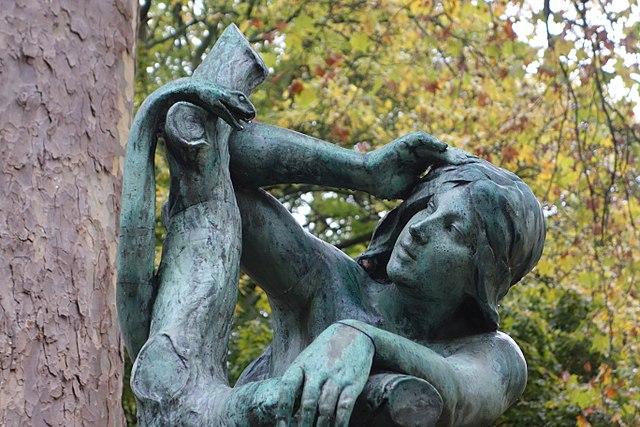In the spring of 2018, I attended an LGBTQ Young Adults meeting at Most Holy Redeemer Church in the Castro “gayborhood” of San Francisco. The meeting facilitator led a session on the Genesis story of the Fall that significantly impacted how I minister with LGBTQ persons.
The central question he asked was: “What was Eve’s original sin?”
Several young adults proposed the usual answers of “disobeying God” and “greed.” As someone who had taught ninth grade Scripture for several years and who was completing a doctorate in theology at the time, I made a strong case for “pride.”
The facilitator agreed that these were all elements of the Fall but proposed that there was one—often overlooked—component of the original sin that was more fundamental than the ones we mentioned.
He explained that in order for the snake to even be able to tempt Eve in the first place with disobedience, greed or pride, the snake had to plant a sinister idea in her mind: that Eve was not good enough just as she was… She needed to be more; she needed to take matters into her own hands in order to “be like God” or to be closer to God. This meant that Eve (and, subsequently Adam) chose to forgo trust in the Creator (Catechism of the Catholic Church, no. 397) and do something to earn a place closer to God.
The temptation toward pride, lust, greed or any of the other cardinal sins stems from this belief that we are not good just as we are.
The temptation toward pride, lust, greed or any of the other cardinal sins stems from this belief that we are not good just as we are. This unawareness of our inherent goodness (or “original holiness” according to the CCC, no. 375) tempts us to seek to fill our imagined void of not-enough-ness through sin.
Knowing this, the snake had to somehow cause Eve to forget that she was fearfully and wonderfully made in the imago Dei (image of God) and that she was already in perfect communion with God in the Garden of Eden. Eve gave in to the idea that she was somehow insufficient. That amnesia about her imago was the root cause of her sin.
The church teaches that original sin refers to humanity’s first act of disobeying God and failing to trust in God’s goodness, which broke the original harmony of the created order, and wounded human nature overall to be inclined toward a similar distrust and alienation, leading to sin. According to the meeting facilitator, the first disobedience resulted from a lack of acknowledgement of our original holiness.
I found this take on the Genesis story profoundly impactful because it guides how we should minister with LGBTQ persons.
The first disobedience resulted from a lack of acknowledgement of our original holiness.
There are strong ties between the concept of original sin and sexual morality throughout our Christian tradition. St. Augustine of Hippo famously argued that original sin is transmitted through the sexual act, thereby linking sin and sexual desire, which has led to a lasting theological emphasis on sexual morality. This legacy continues today, as Catholic leaders often focus disproportionately on issues of sexuality in moral discourse.
LGBTQ ministry is often exclusively focused on efforts to turn LGBTQ people away from homosexual activity or gender-affirming care. Some ministries, like Courage, for example, help guide LGBTQ people toward sexual abstinence. Other groups, when they offer retreats or conferences for LGBTQ persons, are often asked by diocesan leaders whether church doctrine on sexual morality will be emphasized.
In my experience planning various LGBTQ retreats, conferences and other ministry events, I am constantly asked how Catholic sexual doctrine will form a part of each event. Many church leaders want to make sure that we are inculcating attendees about the immorality of homosexual sex or gender-affirming care at every opportunity. Obviously, I am not asked to restate doctrines pertaining to heterosexual sex at any heterosexual ministry event. There is a problematic, disproportionate and (in my view) discriminatory obsession with LGBTQ sexual acts.
Perhaps this is why, in an interview where he felt pressed to take a firm stance on sexual morality issues (pertaining to both homosexual and heterosexual acts), Pope Francis famously stated, “It is not necessary to talk about these issues all the time.”
Like Eve, LGBTQ people have been made to forget that we are wonderfully and fearfully made in the image of God—and that God loves us as we are.
I agree with Pope Francis because, regardless of one’s ethical views on sexual morality, there is a more fundamental issue that should be considered when engaging in this ministry: that like Eve, LGBTQ people have been made to forget that we are wonderfully and fearfully made in the image of God—and that God loves us as we are.
Unfortunately, our church and our society have often reinforced this amnesia throughout our upbringing. The disproportionate insistence on adherence to sexual doctrine, and even the use of words like “intrinsically disordered,” no matter how well-intended, diminish our sense of self-worth by reducing our identity exclusively to the mechanics of a sexual act.
The task of the minister is to combat this amnesia and to remind LGBTQ persons that we are good and worthy of respect and dignity. This is the primordial truth of our existence.
The ironic reality, which I have experienced in my ministry with LGBTQ people for over a decade, is that LGBTQ Catholics are often well-versed on sexual morality doctrine. After all, we have been, for lack of a better phrase, beaten over the head with it since we reached sexual maturity.
When we reorient LGBTQ ministry toward dignity and enough-ness…we behold a beautiful truth: That LGBTQ people are blessed and loved by God.
LGBTQ people do not need more instruction on sexual morality. We need spaces where we can pray, serve, build fellowship and reaffirm our fundamental reality as people made in the imago Dei. Such a ministry can create space for LGBTQ people to come to trust in the goodness of God. When we reorient LGBTQ ministry toward dignity and enough-ness, we make room for God’s grace to flow through our lives and we behold a beautiful truth: That LGBTQ people are blessed and loved by God.
The fruit of God’s blessing permeates our community. Because of this divine love, our LGBTQ community—including our LGBTQ Catholic community—is vibrant, energized, creative, justice-oriented and family-oriented. We take care of each other and advocate for each other. We build familial ties through our “chosen families,” and we seek to promote a world where all are free. This is what being LGBTQ is about and it is why I firmly believe LGBTQ people offer important gifts to the Catholic Church. Remember the words of Jesus: “By their fruits you shall know them” (Mt 7:16).
LGBTQ ministry should be a dedicated space where we can discern God’s will in our lives and where we can share our gifts with the church. While Catholic sexual doctrine offers important insights about our identity, the first step toward reclaiming our own dignity as beings made in the imago Dei is acting against the original sin that causes us to forget that we are good and that God loves us just as we are.




